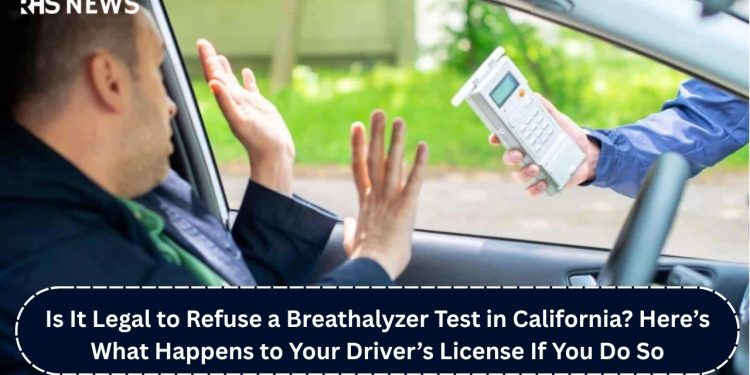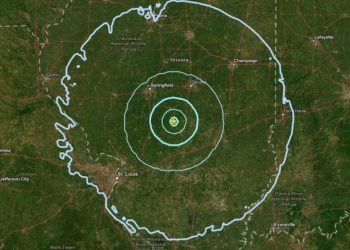California – When a driver is pulled over on suspicion of driving under the influence (DUI) in California, one of the critical moments in the encounter is the request to submit to a breathalyzer test. This test measures the blood alcohol concentration (BAC) in the driver’s breath to assess intoxication levels. However, alcohol breath tests carry significant legal weight, and many drivers wonder whether it is legal to refuse them and what the consequences might be. Understanding California’s laws and the potential impacts on your driving privileges is vital for any driver in the Golden State.
Understanding California’s Implied Consent Law
This Article Includes
- 1 Understanding California’s Implied Consent Law
- 2 Is Refusal to a Breath Test Legal?
- 3 Consequences of Refusing a Breath Test in California
- 4 The Right to Choose Between Breath, Blood, or Urine Tests
- 5 Exceptions to the Refusal Penalties
- 6 Obtaining a Warrant for Blood Draw After Refusal
- 7 Impact on Driving Life and Daily Activities
- 8 Advice for California Drivers
- 9 Conclusion
California operates under what is known as the “implied consent” law. This legal framework means that by obtaining a driver’s license and using California roadways, drivers have implicitly agreed to submit to chemical testing—such as breath, blood, or urine tests—if lawfully arrested on suspicion of DUI. The law is designed to help law enforcement enforce DUI regulations effectively and discourage impaired driving.
If a driver is arrested for DUI and refuses to take the requested breathalyzer or chemical test, they are said to have “refused” the test, which triggers automatic legal consequences separate from any criminal DUI charges.
Is Refusal to a Breath Test Legal?
Technically, drivers can refuse to take a breathalyzer test, but “legal” in this context is misleading because refusal carries mandatory penalties. Unlike some preliminary tests like the preliminary alcohol screening (PAS) test, which drivers can refuse without immediate penalty, refusing the post-arrest breath or blood test is not without consequences. The decision to refuse is a legal right, but exercising it results in substantial administrative and criminal repercussions due to California’s implied consent laws.
Consequences of Refusing a Breath Test in California
The consequences of refusing to submit to a breath test in California are severe and begin with an automatic suspension of the driver’s license imposed by the Department of Motor Vehicles (DMV). This license suspension happens independently of any criminal DUI trial and can disrupt daily life significantly because driving privileges are revoked immediately.
Here is what typically happens:
License Suspension Timeline
-
For a first-time refusal, the driver automatically faces a one-year suspension of their driver’s license. Unlike other types of suspensions, first-time refusal suspensions do not allow for restricted licenses that would let a driver continue to operate under specific conditions during the suspension.
-
A second refusal within ten years leads to a two-year suspension.
-
A third refusal within ten years results in a three-year suspension.
These suspensions start regardless of whether the person is ultimately convicted of DUI. The administrative process for suspension begins once the refusal is recorded.
Additional Penalties and Legal Ramifications
On top of DMV actions, the criminal courts also impose harsher penalties when a driver refuses chemical testing. This includes added jail time—often a minimum of 48 additional hours for first offenders—and increased fines. The courts may also require completion of longer DUI education or treatment programs compared to cases where the test was taken.
Furthermore, refusing a breath test can be used against the driver in court as evidence implying guilt. Prosecutors often argue that the refusal indicates consciousness of guilt, suggesting the driver avoided the test because they knew their BAC would have been over the legal limit. This can strengthen the prosecution’s case in proving impairment.
The Right to Choose Between Breath, Blood, or Urine Tests
It’s important to understand that after an arrest for DUI, the suspect usually has some choice between submitting to a breath test or a blood test. Police officers must inform you of this choice. If a breath test is refused, officers typically offer the option of a blood test. Refusing all chemical tests categorically results in penalties.
Exceptions to the Refusal Penalties
There are limited exceptions where penalties for refusing a breath test might not apply. Medical conditions that make providing a breath sample impossible or inaccurate—such as asthma or other respiratory disorders—may be grounds to challenge refusal allegations. In such cases, the law enforcement officer might require a blood or urine test instead. Additionally, if the traffic stop or arrest itself was unlawful, an attorney might challenge the refusal penalties based on that.
Obtaining a Warrant for Blood Draw After Refusal
If a suspect refuses a breath or blood test, police officers in California have the authority to seek a warrant from a judge to forcibly obtain a blood sample. The warrant process is a safeguard to balance law enforcement’s need to gather evidence with individuals’ rights against unreasonable searches under the Fourth Amendment. While this prolongs the process, refusal alone rarely prevents police from securing blood test evidence.
Impact on Driving Life and Daily Activities
The suspension of a driver’s license due to breath test refusal can significantly affect daily life. Without driving privileges, individuals must find alternative transportation for commuting to work, school, family obligations, or errands, which may be especially challenging in less urban areas where public transit options are limited.
Cities like Los Angeles, San Francisco, and San Diego have relatively extensive public transit networks, but even in these areas, losing a driver’s license impacts lifestyle and employment opportunities. In many smaller or suburban cities across California, the lack of a license can have a critical effect on independence and access to essential services.
Advice for California Drivers
Given the far-reaching consequences of refusing a breath test in California, it is often unwise to refuse post-arrest chemical testing. If you believe you were stopped or arrested without proper legal grounds or if medical conditions affect your ability to take the breath test, consulting a qualified DUI defense attorney as soon as possible is crucial. Experienced attorneys can help assess the circumstances around your arrest, challenge procedural errors, and work towards minimizing penalties.
Conclusion
In summary, while drivers in California can technically refuse a post-arrest breath test, this refusal is not without severe consequences. The automatic license suspension, enhanced criminal penalties, and potential harm to your legal defense make refusal a serious decision. Under the implied consent law, refusing a breath test after DUI arrest triggers mandatory license suspension ranging from one to three years depending on prior offenses, along with fines, potential jail time, and mandatory DUI education programs. Exceptions are limited and legal challenge options depend heavily on the details of each case. If you face a DUI arrest in California, understanding the ramifications of breath test refusal and seeking professional legal counsel is essential to protect your rights and driving privileges.
Helpful Links
- https://zacharymccreadylaw.com/blog/the-consequences-of-refusing-a-breathalyzer-test/
- https://www.esilverlaw.com/faqs/understanding-the-consequences-what-to-expect-if-you-refuse-to-take-a-breathalyzer-blood-test/









